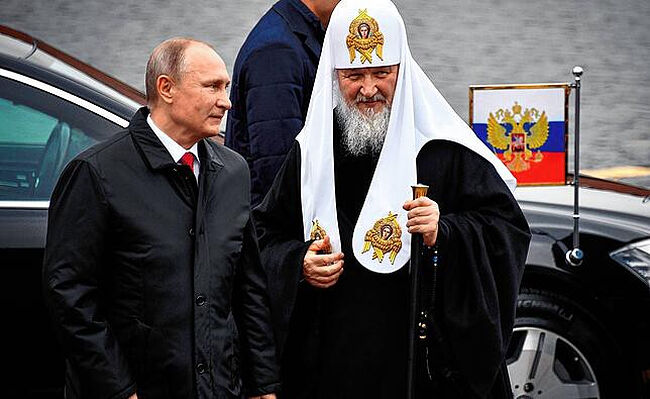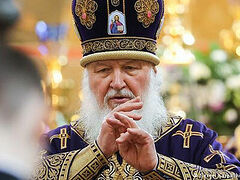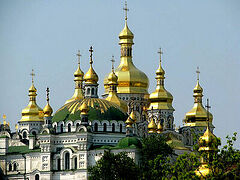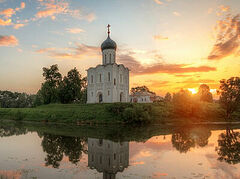Kaleb of Atlanta has offered our readers his views and analysis regarding the famous “Russian World Declaration” published on Public Orthodoxy.
On March 13, 2022, the Sunday of Orthodoxy, scholars, clergy, and laity of the Orthodox Christian Studies Center of Fordham University and the Volos Academy of Theological Research published “A Declaration on the ‘Russian World’ (Russkii Mir) Teaching” through Public Orthodoxy.
The gist of the declaration is that the Moscow Patriarchate (or at least the leading figures of the Moscow Patriarchate) have used heretical ideas to justify and support the Russian Government in their actions in the world, not for the benefit of Orthodoxy, but for the benefit of Russia in particular. These heretical ideas culminate in the teaching of the “Russian World” which, in totality, can be considered its own heresy worthy of universal Orthodox condemnation.
The declaration defines “Russian World” as such:
“The teaching states that there is a transnational Russian sphere or civilization, called Holy Russia or Holy Rus’, which includes Russia, Ukraine and Belarus (and sometimes Moldova and Kazakhstan), as well as ethnic Russians and Russian-speaking people throughout the world. It holds that this “Russian world” has a common political centre (Moscow), a common spiritual centre (Kyiv as the “mother of all Rus’’), a common language (Russian), a common church (the Russian Orthodox Church, Moscow Patriarchate), and a common patriarch (the Patriarch of Moscow), who works in ‘symphony’ with a common president/national leader (Putin) to govern this Russian world, as well as upholding a common distinctive spirituality, morality, and culture.”
Their primary argument against the “Russian World” is that it qualifies as ethnophyletism which was condemned in the 1872 Council of Constantinople, or rather, that ethnophyletism forms the basis of the teaching. Thus, the declaration makes the following points against the teaching:
God’s Kingdom is not of this world. More specifically, “There is no separate source of revelation, no basis for community, society, state, law, personal identity and teaching, for Orthodoxy as the Body of the Living Christ than that which is revealed in, by, and through our Lord Jesus Christ and the Spirit of God.” Any teaching that seeks to replace the Kingdom of God with a kingdom of the world is to be condemned.
Earthly Rulers and Spiritual Leaders have different roles and they should neither be mixed nor should the Church be subordinated to the state. Furthermore, any teaching which replaces obedience to God with obedience to a false claimant as God’s anointed is to be condemned.
No division of humanity, whether it be racial, religious, linguistic, ethnic, or any other mode of division, is superior to another. We are all equal in Christ, and any teaching which asserts special sacredness or purity to any particular division is to be condemned.
“The making of war is the ultimate failure of Christ’s law of love.” “Any teaching that encourages division, mistrust, hatred, and violence among peoples, religions, confessions, nations, or states” is to be condemned. “It is particularly wicked to condemn other nations through special liturgical petitions of the Church, elevating the members of the Orthodox Church and its cultures as spiritually sanctified in comparison to the fleshly, secular ‘Heterodox’.”
Those who promote the idea that we should be spiritually “quiet,” in that they refuse to assist the poor, homeless, refugees, migrants, sick, or suffering, are to be condemned.
“Any teaching or action which refuses to speak the truth, or actively suppresses the truth about evils that are perpetrated against the Gospel of Christ in Ukraine” and “all talk of “fratricidal war”, “repetition of the sin of Cain, who killed his own brother out of envy” if it does not explicitly acknowledge the murderous intent and culpability of one party over another (Revelation 3:15–16)” are to be condemned.
We must analyze the exact nature of this definition and then understand if anyone in the Moscow Patriarchate is guilty of it.
Before I begin, I find it notable that not a single quote is provided by any cleric of the MP, and certainly not Patriarch Kirill, professing anything close to what is defined in this article. In fact, they don’t cite any quotes by any Russian cleric at all. One of the first things done in this article is to accuse Patriarch Kirill of invoking and developing the “Russian World” teaching over the last 20 years. Rather than provide examples of this, they simply make the claim. One could say it was slander. I have so far seen zero statements from Patriarch Kirill or the Holy Synod of the Moscow Patriarchate justifying the war, supporting the war, or professing something similar to the “Russian World” teaching. This is not because I haven’t looked. I have seen every synodal statement since February 24, 2022 and newsworthy homilies of Patriarch Kirill and have not located a single instance of support for the invasion of Ukraine. I’d like to make this request to those who wrote the Declaration: What has Patriarch Kirill or any Russian hierarch said in support of the war in Ukraine or of the “Russian World Teaching.”
As a result of lack of evidence, the rest of this article will assume that no Russian Hierarch has professed the “Russian World” teaching.
Is the “Russian World” teaching a heresy? The 6 Points against it have tangential relation to the posited definition. Is it heretical to believe that there is “a transnational Russian sphere or civilization, called Holy Russia or Holy Rus’, which includes Russia, Ukraine and Belarus (and sometimes Moldova and Kazakhstan)?” I suppose it could be if the belief was that it is impossible for these areas to be separated from Russia or the Russian Church. However, that can’t be assumed and it is not included in the definition. Is it any more heretical to belief some countries belong to a Russian civilizations than it is to believe Constantinople belongs to Greek civilization? Is the Greek Megali Idea equally as deserving of condemnation as heresy because it professes that some areas of Turkey belong to Greece and should be populated by Greeks? Perhaps Greater Serbia is also heretical because they believe in a transnational Serbian sphere or civilization which includes Kosovo, Croatia, Montenegro and Bosnia united by a common Patriarch. Where is the declaration against the “Serbian World” teaching?
This transnational sphere also includes “ethnic Russians and Russian-speaking people throughout the world.” Again, this only could be heretical if it taught that it was a necessity for all Russians and Russian speakers to be of one Church. That would be the 6th type of phyletism. What is done by this Declaration is that it vaguely mixes in actually heretical ideas with a bunch of fluff so that they can condemn people who believe in the fluff as heretics even if they don’t profess the actual heresy.
Is it heretical to believe this Russian world has a common political center?
No. This is not a matter of doctrine or spiritual life and therefore cannot be a heresy.
Is it heretical to believe this Russian world has a common spiritual center?
The example given for this is Kiev as the “mother of all Rus’.” This is not heretical because it is not a matter of doctrine or spiritual life, but it is also not heretical because it is plainly a historical fact. Russia, Belarus, and Ukraine all came from the Kievan Rus, and they all received their Orthodoxy at the same time when Saint Vladimir the Great was baptized. This is commemorated as “The Baptism of the Rus” in Russia, Ukraine, and in Belarus. So I wonder how this would be a facet of some heresy. The Declaration makes a distinction between this and having a common Church, so I wonder what they think it means to believe these countries have a common spiritual center. Believing Kiev is the mother of all Rus is a matter of fact. Disbelief in this would require denial of history.
Is it heretical to believe this Russian world has a common Church and common Patriarch?
It depends. Is the belief that they must necessarily and always have a common Church and Patriarch? That would be heretical. At present, Russia, Ukraine, and Belarus actually do have a common Church and has a common Patriarch. Professing that to be true wouldn’t be a heresy, but saying they must always have a common Church and Patriarch would be phyletism as it draws on ethnicity being a marker of where to draw the borders of a Church’s jurisdiction. Believing that all Russians and Russian speakers in this world must have a common Church and Patriarch is a heresy. It’s the 1st type of phyletism which seeks overlapping jurisdictions for the sake of having some ethnicities be in one Church and some in another. The Russian Church, however, does not profess this idea and neither does the Patriarch.
Is it heretical to believe that there is a Patriarch works in ‘symphony’ with a common national leader?
No. This is how almost all Orthodox royals interacted with the Church from the beginning up until now. Notable examples include Saint Justinian, Saint Constantine the Great, Saint Sergius II the Patriarch, Saint David the Builder of Georgia, Tsar Saint Boris of Bulgaria, Saint Sava of Serbia, and so on and so forth. This contrasts with caesaropapism where the state controls the Church. The Declaration includes “symphony” in quotes. The meaning of this decision is unknown. It could be that the Declaration would like to explain the way in which the Church interacts with the state in a way the reader could understand. It could also be that the writers of the Declaration do not believe that adherents of the “Russian World” teaching believe in symphonia, but rather they suppose that its adherents really believe in caesaropapism which is condemned. I’d like to request those who wrote the Declaration clarify what is the meaning of this.
The above demonstrates that the definition of the “Russian World” barely qualifies as a heresy if at all, and if it does, it is only under specific conditions which are not spelled out by the definition itself. Much of the definition does not qualify as heresy at all because it concerns things which are not doctrinal.





